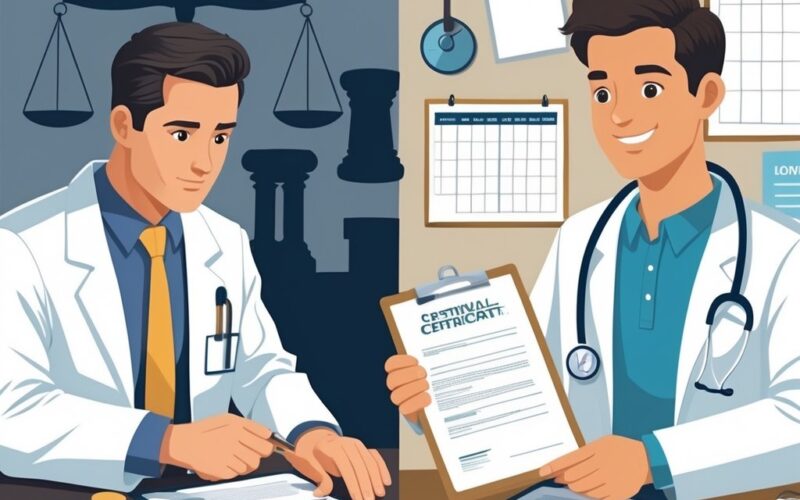If you need medical documentation for legal situations in the Philippines, you might get stuck wondering: do you need a medico-legal certificate or just a regular medical certificate? These two sound similar but actually serve different purposes and have their own legal requirements.
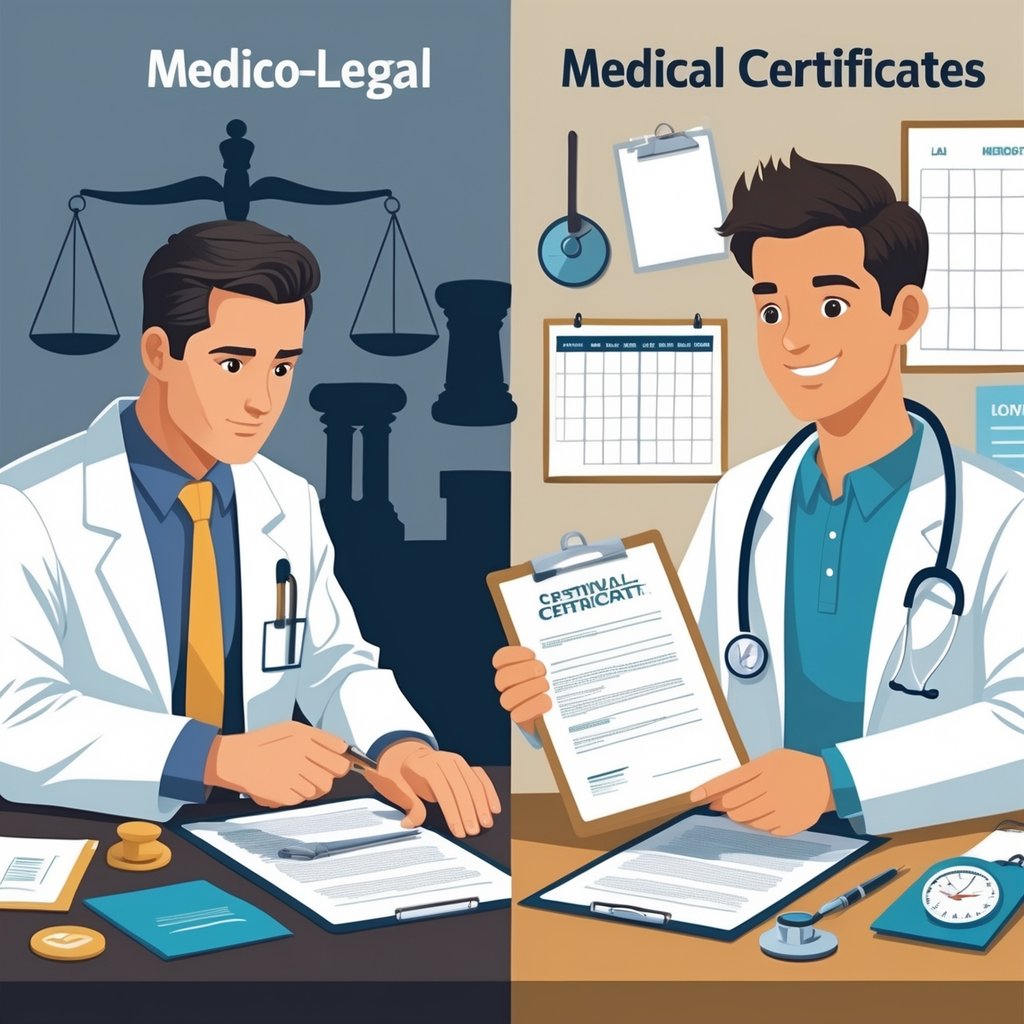
A medical certificate verifies your health condition. People use it for work, insurance claims, or school.
A medico-legal certificate is a different animal. It’s made specifically for legal proceedings and criminal investigations.
If you use the wrong document, your legal case or insurance claim might get delayed or rejected.
The differences go deeper than just the names. Medical certificates and medico-legal reports have different legal requirements, different people who can issue them, and different levels of detail.
Key Takeaways
- Medical certificates verify health conditions for routine stuff, while medico-legal certificates provide evidence for criminal cases and legal actions.
- Only designated medico-legal officers can issue medico-legal certificates. Any licensed doctor can issue medical certificates.
- Medico-legal certificates have more legal weight in court and need sworn statements and detailed injury documentation.
Defining Medico-Legal and Medical Certificates
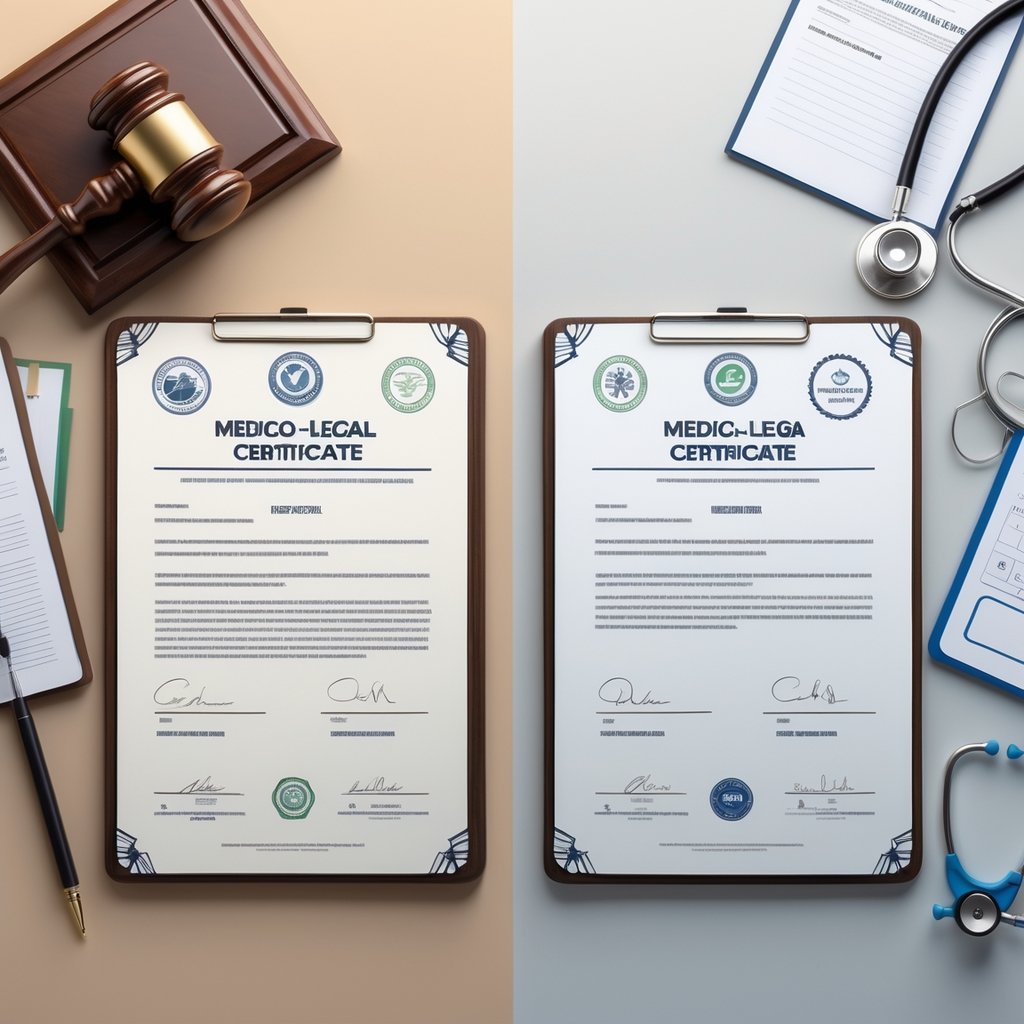
A medical certificate is your doctor’s formal statement about your health. People use it for personal or administrative needs.
A medico-legal report is different. It’s sworn medical evidence made for legal cases and criminal investigations.
What Is a Medical Certificate?
A medical certificate is a formal document. Any licensed doctor can issue it to confirm your current or past health status.
You just ask your attending doctor or hospital for one.
Primary purposes include:
- Sick leave for work
- Insurance claims
- School absence
- Travel health requirements
- Civil court cases
The certificate lists your personal details, exam dates, diagnoses, treatments, and your doctor’s credentials. Your doctor signs and dates it.
Most medical certificates stay valid for 60 days for government benefits like SSS or PhilHealth. Airlines usually want a certificate from the last 72 hours for travel.
Fees range from ₱150 up to ₱2,000, depending on the hospital. You usually get it the same day or within three days.
What Is a Medico-Legal Report?
A medico-legal report is a sworn document that links medical findings to suspected crimes or legal violations. You can’t just ask for one yourself.
Key characteristics include:
- Sworn testimony before a prosecutor or notary
- Detailed injury descriptions and diagrams
- Chain-of-custody records
- Legal opinions on cause and severity
- Crime scene correlation
Medico-legal officers from the PNP, NBI, or municipal health offices handle these reports. They work on assault, sexual crimes, traffic accidents, and suspicious deaths.
The report includes agency details, incident history, exam findings, lab results, and expert opinions. Processing can take 3 to 15 working days, depending on tests.
Courts accept these as public documents without extra authentication.
Role of Practitioners and Issuers
Medical certificates can come from any licensed doctor in the Philippines who examined you. This covers hospital residents, consultants, company doctors, and private practitioners.
Your family doctor, ER doctor, or specialist can issue it. Hospital records departments can also prepare certificates using your chart.
Medico-legal reports need special authority. Only designated medico-legal officers can prepare them for court.
Authorized issuers include:
- PNP Crime Lab doctors
- NBI Medico-Legal Division doctors
- Court-appointed medical experts
- Municipal health officers with the right designation
In rural areas, the municipal health officer often handles both roles. Local governments usually make it official through ordinances.
The issuing doctor must have the right credentials and legal authority for court acceptance. Unauthorized reports might get challenged in court.
Purpose and Typical Use-Cases

Medical certificates support insurance claims and employment documentation. Medico-legal reports focus on criminal cases and provide evidence for prosecutions involving injuries, deaths, or suspected crimes.
Insurance Claims and Benefits
If you file an insurance claim, you need a medical certificate to document your condition. Insurance companies want proof of illness, injury, and treatment.
Medical certificates show fitness for duty and support PhilHealth and SSS claims. You get them from your doctor or company physician.
For workplace injuries, your employer’s physician usually issues the certificate. It should list your diagnosis, treatment dates, and recovery time.
Key requirements for insurance:
- Patient details
- Specific diagnosis or injury
- Treatment and prognosis
- Physician’s license number and signature
Medico-legal reports are rare for regular insurance claims. If a crime is involved, though, insurers might ask for one.
Criminal Prosecutions
Medico-legal reports are crucial in criminal cases involving physical injuries, sexual assault, or suspicious deaths. They link medical facts to suspected crimes.
You can’t just walk in and request one. Law enforcement, prosecutors, or courts must order them.
These reports serve as key evidence in court. They describe injury patterns, healing periods, and whether the injuries match the alleged crime.
Criminal cases needing medico-legal reports:
- Physical assault and battery
- Sexual violence investigations
- Homicide and suspicious deaths
- Traffic accidents with criminal liability
The reports include detailed findings, lab results, and expert opinions on injury causes. They carry more weight than regular medical certificates in court.
Employment and Administrative Matters
Medical certificates matter for work. You need them for sick leave, fitness-to-work, and disability claims.
Company doctors often issue certificates for workplace injuries. These help decide if you’re ready to return after illness or injury.
Government workers need medical certificates for administrative reasons. Civil service rules require health documentation for certain decisions.
Common administrative uses:
- Sick leave approval
- Pre-employment clearance
- Disability benefit applications
- Workers’ compensation
Medico-legal reports only come into play if criminal conduct is suspected. For example, if workplace violence happens, authorities may order them.
Most employers accept certificates issued within 60 days. For travel, certificates usually expire after 72 hours.
Key Differences Between Medico-Legal and Medical Certificates
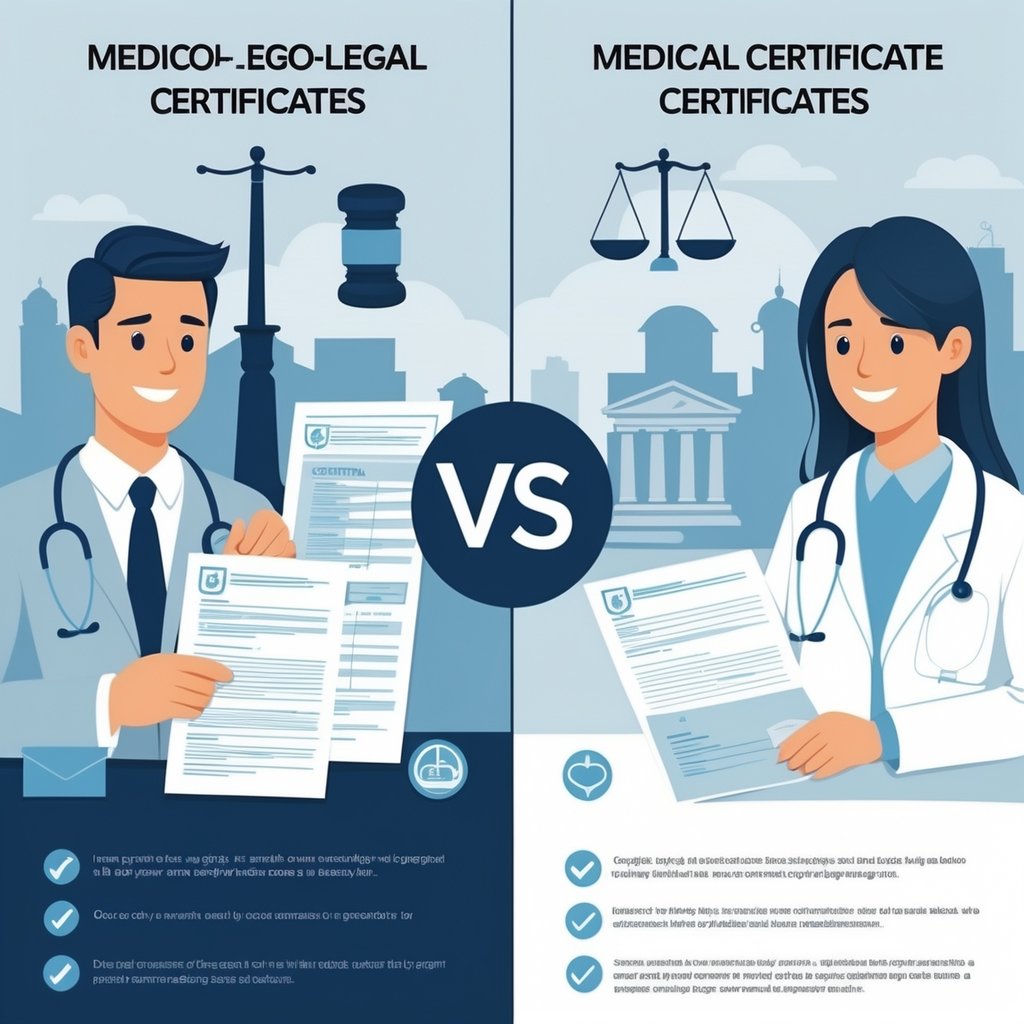
Medical certificates document health conditions for admin purposes. Medico-legal certificates serve as vital evidence in court with sworn testimony and detailed injury analysis.
Content and Scope
Medical certificates list basic info: your name, diagnosis, treatment dates, and doctor’s recommendations. They keep details simple and focus on fitness for work or school.
Medico-legal certificates include comprehensive documentation: injury descriptions, anatomical locations, and measurements. You’ll see wound patterns, healing times, and disability assessments.
These certificates may have photos, body diagrams, and lab results. They also note the timing and circumstances of the incident.
Key Content Differences:
| Medical Certificate | Medico-Legal Certificate |
|---|---|
| Basic diagnosis | Detailed injury analysis |
| Treatment summary | Forensic measurements |
| Fitness assessment | Legal implications |
| Standard medical terms | Technical legal language |
Legal Weight and Evidentiary Value
Medical certificates carry limited evidentiary weight in court. They’re fine for admin purposes, insurance, and civil matters.
Medico-legal certificates work as documentary evidence. They require oath-taking before prosecutors or notaries, so courts admit them in criminal cases.
Courts see medico-legal certificates as expert testimony. Your case benefits from their self-authenticating nature if a government medical officer issues them.
The evidentiary weight is not the same. Private medical certificates need the doctor to testify, but government-issued medico-legal reports count as public documents.
Authorities and Addressees
You can ask for a medical certificate from any licensed doctor, hospital records department, or your attending physician. They issue these on request for personal use.
Medico-legal certificates need a formal request from law enforcement, prosecutors, or courts through subpoena duces tecum. You can’t get these on your own.
Authorized Issuers:
- Medical certificates: Any licensed doctor
- Medico-legal certificates: PNP Crime Lab, NBI Medico-Legal, designated municipal health officers
The recipients differ too. Medical certificates go to employers, schools, insurance companies, or you. Medico-legal certificates go to prosecutors, judges, police, and lawyers handling your case.
Legal Framework and Philippine Regulations
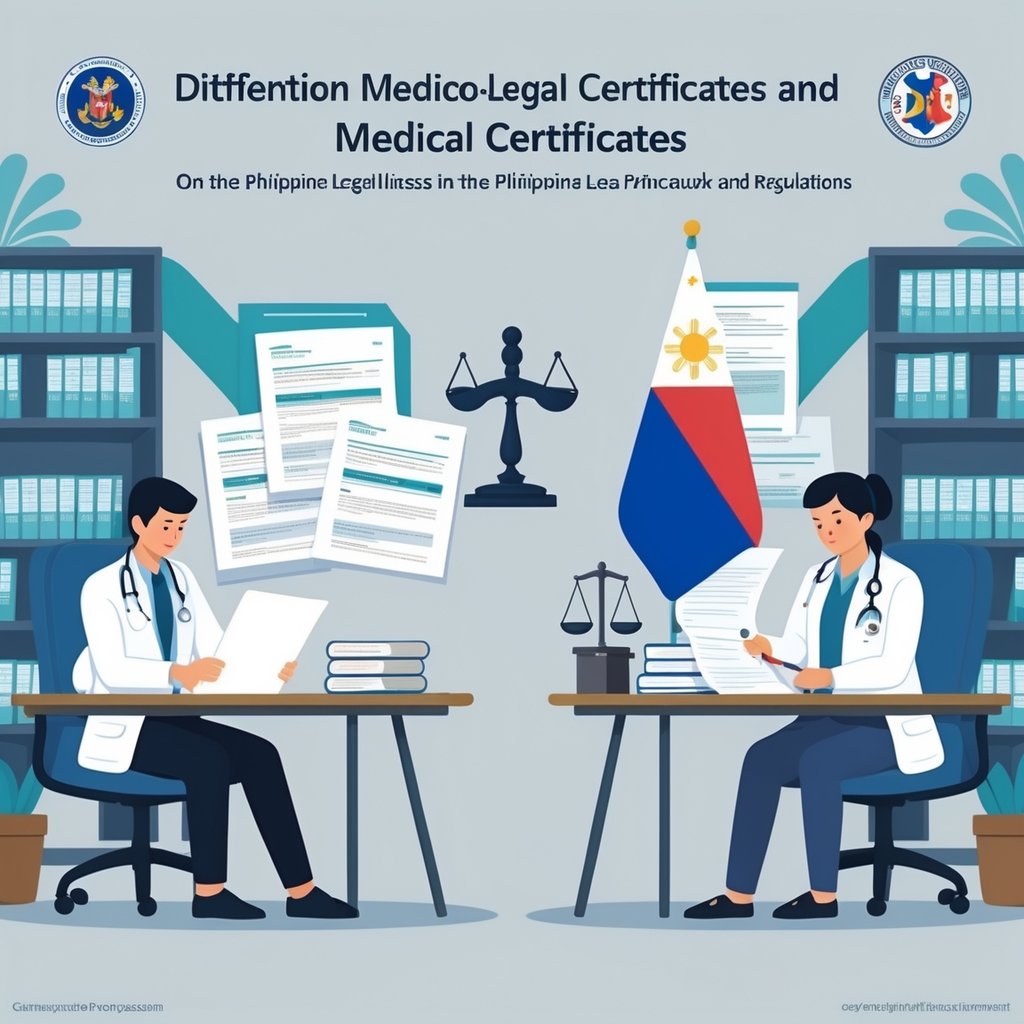
Philippine law draws clear lines between medical certificates and medico-legal reports through specific statutes and professional rules. The Data Privacy Act and medical accountability laws set rules for how doctors must handle these documents.
Relevant Laws and Standards
The Revised Penal Code Articles 171-174 sets criminal penalties for falsifying medical documents. Falsifying a medico-legal report brings stiffer penalties than a standard medical certificate.
Rules of Court Rule 132 sections 24-25 treat these documents differently. Government medico-legal reports are self-authenticating public documents. Medical certificates need extra authentication unless notarized.
The Data Privacy Act (RA 10173) treats medical info as sensitive personal data. You need written consent to release medical certificates. Medico-legal reports have exceptions for lawful orders and law enforcement.
RA 8981 and PRC Resolution No. 425 hold doctors accountable. Issuing false certificates can cost them their license.
Professional Accountability of Physicians
Your professional license rides on your integrity when issuing medical documents. The Professional Regulation Commission can suspend or revoke your license if you issue false certificates.
Liability levels change depending on the document type. Falsifying medical certificates can lead to prision correccional penalties. If you falsify medico-legal reports as a physician, you face medium to maximum prision correccional terms.
Civil liability comes into play under Civil Code Articles 19 to 21. Patients may sue for damages if you issue negligent or deceitful medical documentation.
Never pre-sign blank certificates or documents. Each certificate demands your personal examination and sound professional judgment at the time you issue it.
Admissibility and Use in Philippine Courts
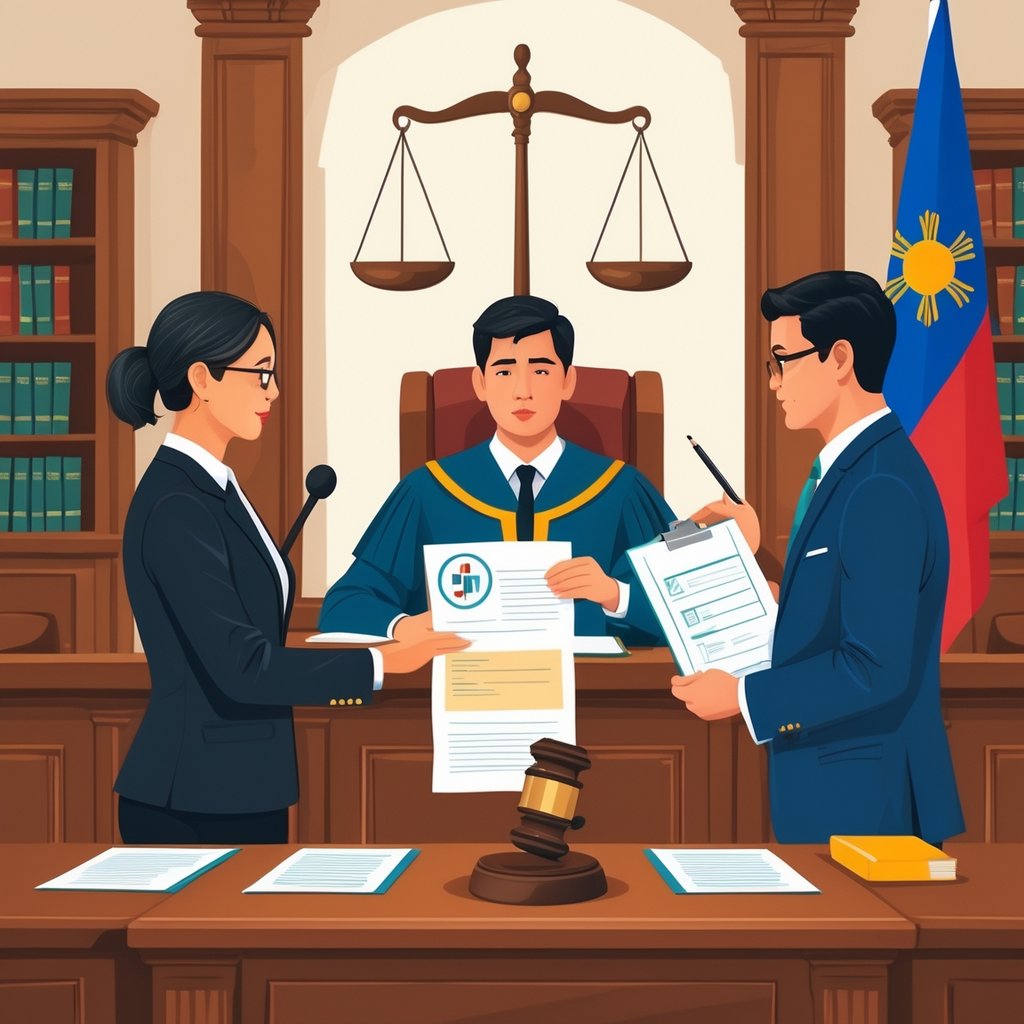
Medical certificates and medico-legal reports both serve as documentary evidence in Philippine courts. Their admissibility requirements differ, though. Medical reports prepared by licensed medical professionals require proper authentication. Government-issued medico-legal documents carry more evidentiary weight.
Authentication and Due Execution
You need to authenticate private medical certificates before a court will admit them. Proving the document’s genuineness usually means presenting witness testimony or other supporting evidence.
Private medical certificates require the issuing physician to testify and identify the document. The doctor must confirm their signature and explain the medical findings.
Government medico-legal reports are self-authenticating under Rule 132 of the Rules of Court. Medical certificates for medico-legal cases issued by public Philippine hospitals are considered official documents and courts rarely challenge them.
Notarized documents carry more weight than simple medical certificates. Once you notarize a medical certificate, it becomes a public document with a strong presumption of authenticity.
Hospital discharge summaries don’t automatically become admissible in court. You still need a proper medical certificate signed by the attending physician for legal purposes.
Physician Testimony and Privilege
Physician-patient privilege matters when using medical documents in court. This privilege guards confidential medical information.
The privilege stays in place until the patient places their medical condition “in issue” in court. Once your health becomes a legal dispute, you may waive the privilege.
Expert testimony from the examining physician boosts the document’s credibility. The doctor can explain medical terms and clarify findings for the court.
Written consent is required under the Data Privacy Act before you release medical information. There are exceptions for lawful court orders and subpoenas.
Cross-examination lets opposing parties challenge the medical findings and test the doctor’s conclusions.
Role as Documentary Evidence
Medico-legal findings are admissible in court as evidence under the Revised Rules on Evidence. Their weight changes depending on the type of case and the support from testimony.
Prima facie proof is what medical certificates offer for physical conditions. They establish basic facts about injuries or illness but often need extra support.
Medico-legal reports carry more weight since they connect medical facts to legal implications. They help establish qualifying circumstances in criminal cases.
Courts look at timing when they evaluate medical evidence. The value of medico-legal certificates in legal proceedings is significantly influenced by the timing of the examination.
Supporting evidence like medical records, photographs, and lab results can strengthen your medical documentation. Comprehensive evidence makes your case stronger.
Frequently Encountered Issues and Practical Considerations
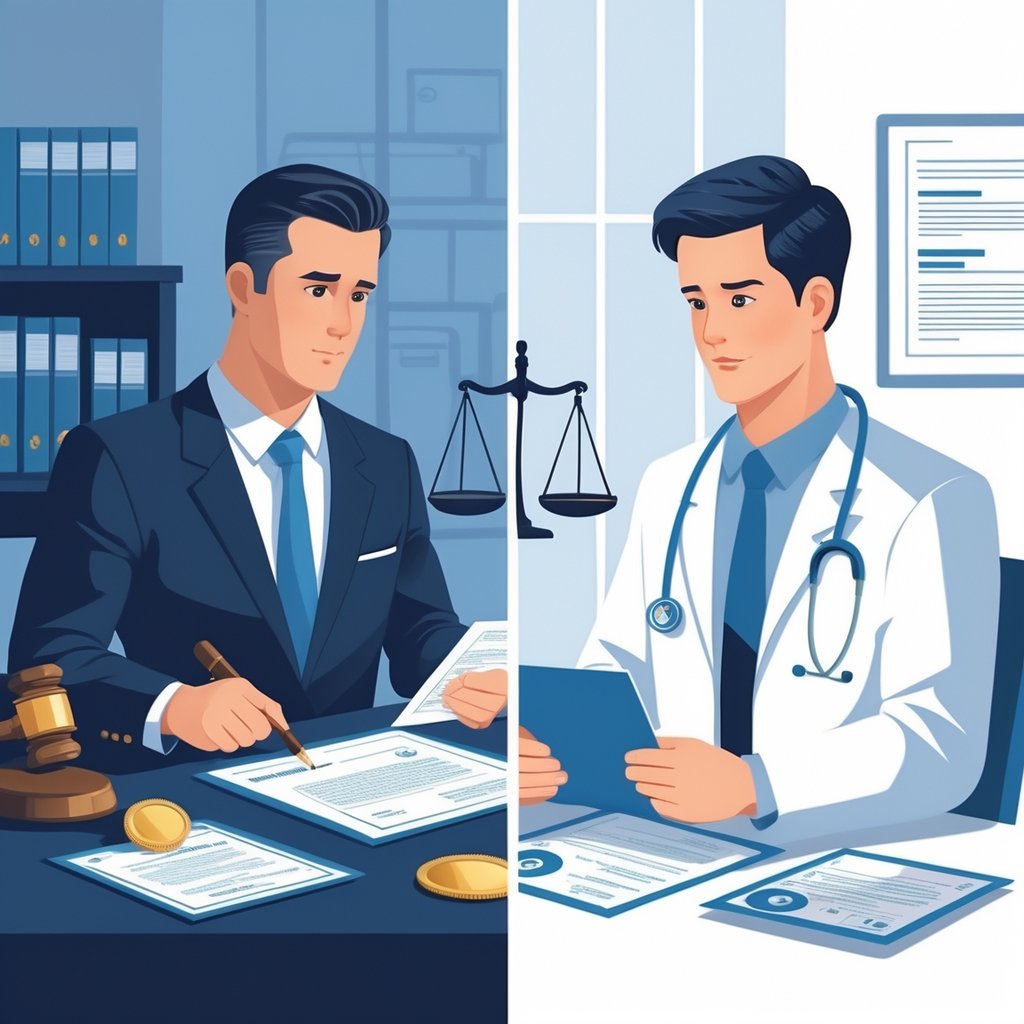
Legal cases often stumble due to incomplete documentation. Practitioners deal with growing scrutiny over patient data handling and proper report protocols.
Filing Cases Without Complete Medico-Legal Reports
Many criminal cases get dismissed when prosecutors rely on basic medical certificates instead of proper medico-legal reports. Incorrect or incomplete medico-legal reports may trigger delays in legal proceedings and violate patient rights.
You can’t use a hospital discharge summary instead of a medico-legal report in serious criminal cases. Prosecutors usually reject medical certificates for charges involving physical injuries, sexual assault, or suspicious deaths.
The medico-legal officer should examine the victim within 72 hours if possible. Delays weaken evidence quality and reduce the report’s legal value.
Common documentation failures include:
- Missing chain of custody records
- Incomplete injury descriptions
- No proper authentication
- Missing photographs or diagrams
Private physicians can’t issue medico-legal reports unless the local government specifically designates them. Only authorized medico-legal officers from the PNP, NBI, or municipal health offices can prepare these documents for criminal proceedings.
Implications for Data Privacy
The Data Privacy Act tightly controls how you handle medical information in certificates and medico-legal reports. Patient consent requirements differ between these documents.
You need written patient consent before releasing medical certificates to third parties. Medico-legal reports fall under lawful exceptions when prosecutors or courts request them.
Key privacy considerations:
- Medical certificates need specific patient authorization
- Medico-legal reports can bypass consent if legally mandated
- Both documents need secure storage and transmission
- Unauthorized disclosure can mean penalties up to ₱5 million
Practitioners should verify the requesting party’s legal authority before releasing any medical documentation. Police officers need proper written requests, not just a verbal demand.
Correct Handling by Practitioners
You need to know which document type fits each situation. The best way to handle medico-legal issues is by preventing them through solid documentation.
Never pre-sign blank certificates or reports. Always examine patients yourself before issuing any documentation. Record findings in objective, measurable terms using anatomical descriptions.
Proper documentation means:
- Use 24-hour time formats for all examinations
- Give detailed injury measurements and locations
- Take clear photographs with proper labeling
- Keep a complete chain of custody record
Everyone treated in a physician’s practice should have a medical record that documents treatment, prescriptions, and recommendations. This record supports both certificate and report preparation.
Contact your medico-legal officer right away for cases involving suspected crimes. Delaying documentation weakens legal cases and puts you at risk for professional liability.
Frequently Asked Questions
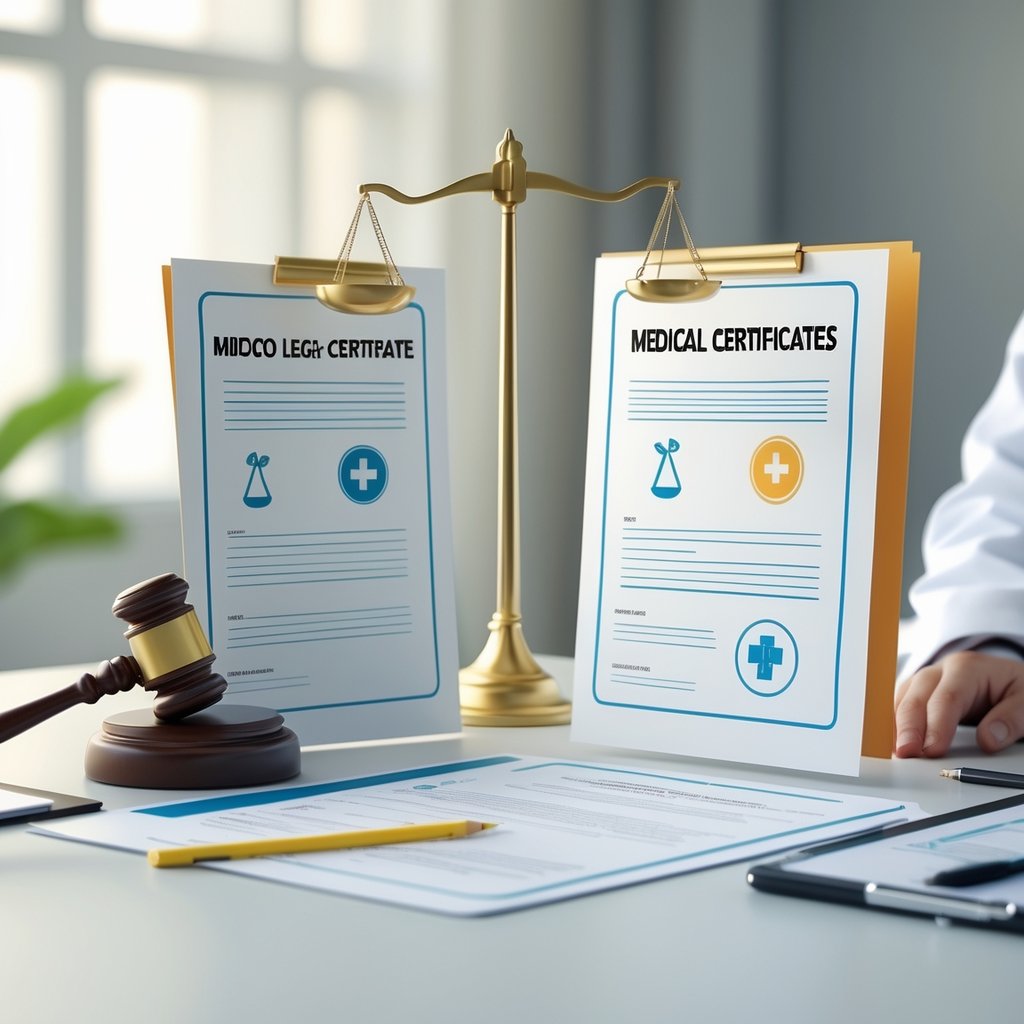
Medical certificates and medico-legal reports serve different roles in healthcare documentation. Each document comes with its own requirements for content, issuance, and legal validity.
What is the difference between a medico-legal report and a medical certificate?
A medical certificate documents your current health condition or fitness for work. Your doctor can issue this for employment, school, or insurance.
A medico-legal report details medical findings for legal proceedings. Law enforcement or court authorities usually request these reports to establish evidence in criminal or civil cases.
The real difference is their purpose. Medical certificates focus on health status. Medico-legal reports connect medical findings to legal matters like injuries from accidents or crimes.
How can one obtain a medical certificate for employment purposes?
Visit a licensed physician or medical facility. Bring a valid government ID and any relevant medical records.
The doctor will perform a physical exam. This may include basic tests like blood pressure, vision screening, and a general health check.
Most employment medical certificates are ready the same day. Some employers want specific forms or tests, so check with your HR department before you go.
What constitutes a valid medical certificate for leave of absence?
Your medical certificate should include your full name, age, and address. The document must clearly state your diagnosis or medical condition.
The certificate needs your doctor’s license number and signature. It should specify the recommended rest period or treatment duration.
Medical practitioners can issue certificates even after your sick leave begins. The certificate should be dated and include the medical facility’s official letterhead or stamp.
What information is typically included in a medical certificate to indicate fitness to work?
The certificate will state if you are fit for regular duties or if you have work restrictions. It should mention any physical limitations like lifting restrictions or modified hours.
Your doctor includes the exam date and their assessment. The document lists any ongoing treatments or follow-up needs.
Some certificates say if your work capacity is temporary or permanent. They might recommend workplace accommodations or gradual return-to-work schedules.
How does a medical clearance differ from a standard medical certificate?
Medical clearance confirms you’re free from certain diseases or conditions. Employers often require this before hiring or for specific job roles.
A standard medical certificate documents your current health or illness. It may recommend time off work or treatment.
Clearance certificates often require extra tests like chest X-rays or blood work. They confirm you meet health standards for your job or travel plans.
What are the main distinctions between a medical abstract and a medical certificate?
A medical abstract sums up your full medical history from hospital records. It covers treatments, procedures, and test results in detail.
A medical certificate, on the other hand, zeroes in on your current condition for a specific reason. People usually need it for work, school, or sometimes legal matters.
Medical abstracts tend to be longer, packed with health data. Certificates are usually just a page, listing only the basics.






